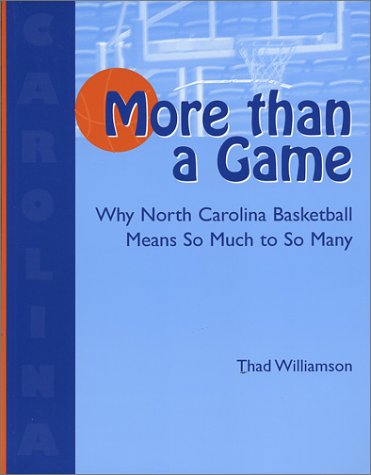More Than a Game: Why North Carolina Basketball Means So Much to So Many Review


More Than a Game provides a unique look at both North Carolina basketball and the phenomenon of sports fanhood in the United States. For serious North Carolina basketball fans, following the team is more than just another recreational activity -- it's an irreplaceable part of who they are. Every winter, Carolina fans habitually schedule their lives around the Tar Heels during the season. Many fans say that following the team is one of the most valuable and enduring attachments in their lives.
But is this a good thing? What are the implications of so many people being so in love with Carolina basketball? Are there better and worse ways to be a fan? And why, exactly, does North Carolina basketball have such a hold on its loyal followers?
Thad Williamson, a lifelong fan who also has covered North Carolina basketball as a journalist, probes his own fan history and those of hundreds of others to offer a unique perspective on those questions. In Part One, Williamson tells the story of how he grew up in Chapel Hill as a diehard Carolina basketball fan, and how the lessons learned from following the Tar Heels so closely impacted his life, his family, and the very town of Chapel Hill itself. For hard-core Tar Heel fans growing up during the Dean Smith era, Carolina basketball represented not just a winning basketball team, but a powerful example of the right way to do things.
Williamson then turns to a detailed description of his five years covering the Tar Heels as a part-time journalist and columnist. Those five years, 1995 to 2000, coincided with the end of the Dean Smith era as well as Bill Guthridge's tenure as head coach. Williamson provides an insight-packed look at the many ups and downs of those five seasons. This section also discusses the tensions involved when on-the-court struggles coincided with the willingness of some fans to use the Internet and other outlets to voice criticisms of players and coaches.
Part Two of the book examines more directly the pros and cons of being a Tar Heel fan and the role it plays in fans' lives. Williamson combines a theoretical discussion of those questions with two powerful, unique sources of evidence about Carolina fans. The first is the Fan Diaries Project carried out during the 2000-01 season. Fifteen hard-core North Carolina fans from all over the country spent the season recording their behavior, reactions, thoughts and emotions as fans in a diary format. In doing so, these fans combined to provide a telling and often entertaining portrait of how Carolina fans experience basketball season.
The second source of evidence is the North Carolina Basketball Fan Survey. Over 600 fans completed a detailed, 86-question survey about both how they view North Carolina basketball and the role following the team plays in their lives. Williamson carefully examines this evidence to provide a thorough account of who North Carolina fans are, what they think, and how they behave. In the process, he shows how devotion to Carolina basketball can have both healthy and unhealthy consequences.
Throughout the text, Williamson combines his observations with those of some of the hundreds of fans who participated in the book project, as well as observations from coaches Dean Smith, Bill Guthridge, Matt Doherty, and Phil Ford. An engaging narrative that asks all the hard questions, More Than a Game provides a powerful look at the phenomenon of North Carolina basketball. This is a book certain to stir the hearts and challenge the minds of Carolina fans everywhere.



















